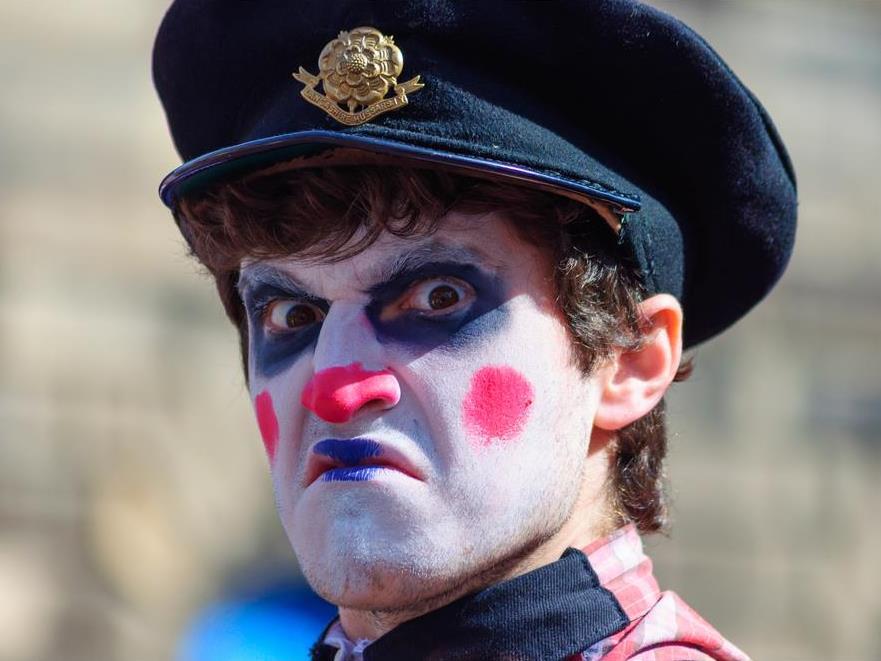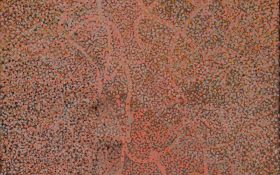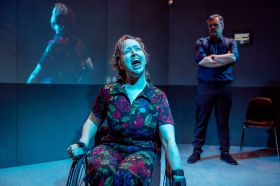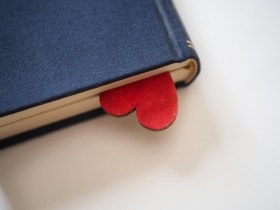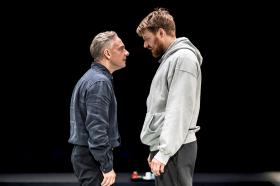Performer on the high street during the Edinburgh Fringe, August 2016. Image via Shutterstock.
Hosting a free venue at the Edinburgh Fringe for 10 years has given UK artist Andy Field valuable insights into the pressures young theatre-makers place on themselves.
Speaking recently at the Australian Theatre Forum (ATF) in Adelaide, Field said that running Forest Fringe – a space for new and experimental work within the challenging commercial environment of the Edinburgh Festival Fringe – led him and his two co-founders down the very same path they were trying to avoid.
The combination of working late into the night, every night, before hitting the festival’s artists’ bars and VIP areas, led to a state of constant exhaustion, Field explained in his keynote address to the ATF.
‘I remember feeling proud of my exhaustion – a humblebrag used to elicit sighs of sympathy and respect,’ he said.
‘Our lack of sleep was evidence of something good about ourselves, even if we couldn’t exactly describe what that thing was.’
Looking back on the 10 years of Forest Fringe at Edinburgh, Field said he could now identify two main sources of his ‘curious and misplaced pride’.
The first, he explained, was working in a London theatre which, like many theatres, ‘inspired an incredible devotion in the people who worked there’.
‘Young people, attempting together to realise almost impossibly ambitious projects with the most meagre of resources, resulted in a kind of collective relentlessness that was both exhausting and intoxicating,’ said Field.
He and other would often work ‘almost competitively late,’ trying to outdo one another with their commitment to their art; doing a job that was ‘more than work, and that this must not be the case for those who chose to go home on time. It was in this environment that I learned what I thought it looked like when you really cared about something. It looked exhausted. Bleary-eyed but wildly righteous. A look shared across a darkened office, across other people’s unattended desks.
‘And lurking somewhere in that look was a look that it took me a long time to realise I was making; a judgement about your level of commitment to a project if you weren’t willing or able to push yourself to this same, unsustainable degree.’
The second reason for such misplaced pride in exhaustion was the Edinburgh Festival Fringe itself.
‘Over the 10 years we were there we watched it mutate into something bigger and much more horrifying … a month-long, 24/7 wonderland; an astro-turfed theme park of binge-able culture and sponsored consumption,’ he said.
Fringe Festivals, especially Edinburgh with the allure of its late night artists bars, have a certain, dangerous allure – especially in light of the typical artist’s life.
‘Earning very little, performing in tiny Fringe theatres, living in shared houses in unglamorous parts of town – it can lead you questioning whether there is any point in carrying on. Feeling like what you do is desired, important even – even if only in the fairy-light phantasmagoria of the Edinburgh Fringe Festival – can help you keep going when otherwise you might not,’ Field explained.
The exhausting, party-til-dawn lifestyle followed by working until very late the next day, felt like ‘a righteous demonstration of how much I cared and evidence of how wild and radical and young we obviously were,’ he explained.
The end of sleep
In trying to demonstrate to himself and others his commitment to art and theatre, Field said he fell into a trap identified by author Jonathan Crary in his book, 24/7: Late Capitalism and the Ends of Sleep.
‘As Crary states: “There are now very few significant interludes of human existence – with the colossal exception of sleep – that have not been penetrated and taken over as work time, consumption time or marketing time,” … which brings us back to the Edinburgh Festival. The Edinburgh Fringe is … a 24/7 city in microcosm, boiled down to its most vivid and compulsive elements. It is where sleep goes to die,’ said Field.
‘To Crary, sleep is important because nothing of value can be extracted from it and consequently it is our final line of resistance against the apparently irresistible forces of modernisation. It is where our conformity to capitalism must end. Indeed in sleep we reclaim another kind of space – a space of vulnerability which necessitates care and protection, which demands a kind of social order outside of the vicissitudes of production and consumption.
‘Sleep then is not only important because as yet we can’t buy anything in it; it is perhaps also the place from which we begin to think of a world outside of capitalism. A space of mutuality, community and care, uncorrupted by the principles of competition and individualism. To sleep, perchance to dream.’
Read: Freeing the arts from the yoke of neoliberalism
Field and his colleagues at Forest Fringe had hoped to create a world outside of capitalism, ‘but we were young and we thought the best way to do so was to stay up as late as we could. We worked until we cried and we went to all the parties, which may seem like opposite things but are perhaps the same thing. Part of exactly the set of ideas about the world and how it works that we thought we were resisting,’ he said.
‘We were resisting those ideas in some ways but in other ways we were in fact perpetuating them too. And one of the stories of Forest Fringe is the story of that conflict – of our distance from and occasional closeness to the glitter and allure of the rest of the festival and the ideology that organises it. We were and still are finding our way towards something better. And perhaps this talk is about a way in which we stumbled, perhaps even failed. Though we try not to lose too much sleep over it.’
The Australian Theatre Forum 2017: About Time ran from 3-5 October in Adelaide. Visit www.australiantheatreforum.com.au for details.
